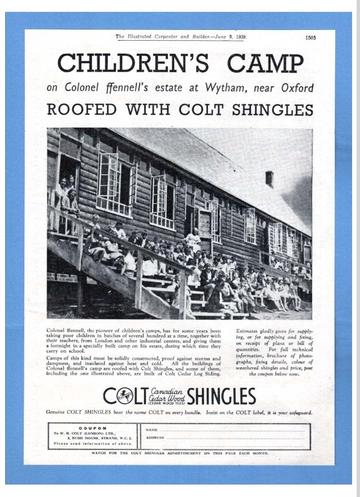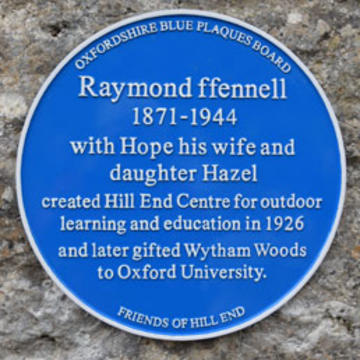The Hill End Centre: 100 Years of Outdoor Education

Hill End 1939 poster
If you grew up in Oxfordshire you will likely already know Hill End, and the chances are you will have visited as a child for a day trip or residential stay. One of the many delights of working at our much-loved outdoor education centre is hearing the stories shared by the adults that come through our gates - the teachers, parents, grandparents, delivery drivers and contractors. They are bursting to tell us about their memories, reverting to childhood excitement and recalling every detail.
If you don’t know Hill End, you may have driven straight past one of Oxfordshire’s gems – an oasis of natural calm just 3 miles from the city Centre. Our beautiful and special place occupies 67 acres of woodland and meadows of what was the Wytham Estate. Originally a farm, it was transformed into a pioneering outdoor school for the poor and disadvantaged in the 1920s and 1930s by Raymond and Hope ffennell, who then owned Wytham Abbey.
Hill End also represents an important part of the evolution of outdoor education as a concept in this country. The early twentieth century was a key moment in the development of approaches moving away from conventional and formal schooling to a more holistic approach, particularly valuing time spent outside in nature.
Our volunteer historian Meryvn Hughes has helped us connect some of these early dots, noting that Raymond ffennell is thought to have formed his ideas by attending a key conference in Oxford in 1922. This is where Rudolf Steiner introduced his Stuttgart ‘Waldorf School’ philosophy, encouraging practical skills, imagination and creativity. Originally named Schumacher, the ffennells were a partly Jewish family of German descent, in common with the rather harsher Dr Kurt Hahn, who founded Gordonstoun in 1934 - later the birthplace of the Outward Bound Organisation and the Duke of Edinburgh Award. During this period, Baden-Powell was already developing the Scout movement - one of whose earliest camps is at Youlbury, just across the valley from Hill End - and the first YHA Youth Hostel opened in 1931.
We are lucky to have some records from teachers from the early days of Hill End, often quite amusing. One noted in 1954,
“The top dormitories were not fenced off so the cows got underneath and it was quite common to have one sleeping directly beneath the floor boards of the dormitory, and to be lulled to sleep by the contented lowing of a cow a few feet away. We slept on metal slatted beds with straw paillasses. When it rained the rain came through the roof … the children took all of this in their stride and loved every minute of their week.”
Over the next decades, thinking around outdoor learning went through many incarnations. In the later twentieth century, focus shifted to a more scientific approach and Hill End became a Field Studies Centre, less of a summer ‘camp’. As school curriculums changed and timetables became tighter this was squeezed, and at the turn of the Millennium, the Forest School movement gained prominence. Originating in Scandinavia, this advocates child-led experiential outdoor education, and Hill End has now trained many hundreds of Forest School Leaders.
So, what would the Ffennell family make of outdoor education in the twenty-first century? We like to think we have used the experiences of the past to take the best ingredients of each to provide nature-immersive learning to a generation that has never been so disconnected from the natural world. It is sometimes tempting to think that these schools of thought are just different names for the same thing according to educational fashion, but they have evolved to meet the particular needs of the times. For the current generation, facing a climate crisis and devastating species loss, we are incorporating more sustainability teaching even for the youngest to ensure they value and protect nature. What has stayed the same is the recognition that being outside in green spaces is so valuable for so many other reasons – for socialising, physical health and mental wellbeing.
And what has changed in the landscape of Hill End? Not a great deal is the honest answer, despite the tarmac car park and Wi-Fi routers. The Ffennells would certainly recognise most of our surroundings today. The classrooms and barn are as much as they have been for generations, and the gigantic cooking pots are still used to feed hundreds of hungry children. Our wooden dormitories that sit proudly on the hillside no longer leak in the rain but are certainly basic, with outdoor shower and toilet blocks. The 1930s swimming pool was too costly to maintain, but the loss of the cold water plunge is not mourned by everyone. The trees have grown in the farmland to create more wooded corners, but Hill End is still as beautiful and peaceful as ever.
It might also be argued that the barriers to outdoor learning are as high today as they were when the ffennells first brought the urban poor out from Oxford city. There are huge pressures in modern education that make it more and more difficult for schools to visit. The era of the week away at Hill End has long since passed, and we are delighted to see classes even for a 24- hour long ‘sleepover’. As well as a crisis in staffing there are anxieties from parents, worries over risk assessments and allergies, even before thinking about the cost, which can be many hundreds of pounds for the coaches alone. Both Hill End and the children are indebted to all those wonderful, determined teachers who share our passion for outdoor education and make it happen.
And we also agree that our education system shouldn’t be isn’t a one size fits all, just as the Ffennells advocated for their daughter Hazel. Today we welcome thousands of children from special schools or those who struggle in mainstream education through our alternative education programmes. While recognising that not everyone is getting what they need (and funding and referrals can be frustratingly uneven), we are proud of what we are achieve, and that we are continuing a 100-year legacy of providing outdoor learning to those who benefit most.

Hill End Blue Plaque
Could you be part of the next chapter of the Hill End story? Raymond Ffennell bequeathed the Wytham Estate to the University of Oxford in the 1940s, with a deed of trust to ensure Hill End continued to be used for the education of children. It was managed by local authorities for many decades and often threated with closure. After Oxfordshire County Council decided it could no longer afford to run the centre, it became an independent charity in 2017 thanks to our wonderful trustees who were determined to save it. Hill End receives no funding from local or central government, so needs to make its own way, supported by our visitors and the tireless volunteers who supplement our tiny core team. If this blog has sparked your interest and you would like to get involved, please visit our website: https://hill-end.org/help-us
Lucy Crittenden
Lucy is Centre Director of Hill End, a much-loved outdoor education centre between Farmoor and Wytham. She joined Hill End in 2018 and became director four years later. She has always been passionate about nature and education, and has worked previously at the Environment Agency, University of Oxford and in schools teaching secondary science.
See also


